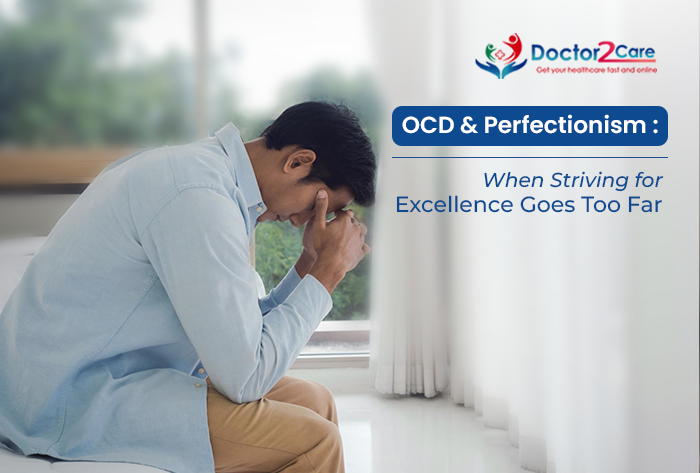OCD and Perfectionism: When Striving for Excellence Goes Too Far

Perfectionism is often seen as a positive trait, driving individuals to achieve their best. Nonetheless, when perfectionism evolves into an overwhelming and unmanageable force, it can precipitate the onset of Obsessive-Compulsive Disorder (OCD).
The connection between OCD and perfectionism is complex, underlying the significance of understanding this link for the enhancement of mental well-being.
This blog is where we will take you into the relationship between OCD and perfectionism, its repercussions on individuals, and how indispensable support offered by online doctor consultation in India can help reduce the unmanageable force.
Understanding Perfectionism
Perfectionism involves setting excessively high standards for oneself, often leading to relentless self-criticism and hard hunger of flawlessness. While perfectionism can motivate individuals to excel in various areas of life, it can also trigger distress and anxiety when those impossibly high standards are not met.
The Link Between OCD and Perfectionism
OCD is characterised by intrusive, distressing thoughts (obsessions) and repetitive behaviours or mental acts (compulsions) aimed at reducing anxiety caused by these obsessions. Many individuals with OCD exhibit perfectionistic tendencies, which drive them to perform compulsions until they feel everything is "perfect" or until they alleviate their obsessive fears.
When Perfectionism Becomes a Problem
While not all perfectionists have OCD, many individuals with OCD exhibit perfectionism as a core feature of their condition. For them, the need for perfection can extend to daily life activities, including cleaning, organising, and even personal appearance. The pursuit of flawlessness can be overwhelming, causing substantial emotional distress.
Consequences of Uncontrolled Perfectionism in OCD
- Impaired Quality of Life
OCD's perfectionist nature can lead to considerable impairment in one's quality of life. Simple tasks may become excessively time-consuming, affecting relationships, career, and overall well-being.
- Psychological Distress
Uncontrolled perfectionism in OCD can lead to heightened anxiety, depression, and a persistent sense of failure, often causing a vicious cycle that worsens OCD symptoms.
- Isolation
Those battling perfectionism in OCD may isolate themselves from others to avoid judgement and to have complete control over their environment.

Online Doctor Consultation in India: A Lifeline
Reaching out for help is the first step towards managing OCD and perfectionism. Online doctor consultation in India offers a convenient and accessible way for individuals to seek professional guidance. Here's how it can make a difference:
- Accessibility: Online consultations break down geographical barriers, making it easier for individuals in remote areas to access mental health professionals.
- Anonymity: Many people find it easier to discuss their struggles with perfectionism and OCD online, preserving their anonymity and reducing the fear of judgement.
- Specialised Care: Online platforms often connect patients with specialists who have experience in OCD and perfectionism treatment.
Conclusion
Perfectionism can be a double-edged sword, driving individuals to strive for excellence but also leading to the development or exacerbation of OCD. Recognizing the harmful consequences of uncontrolled perfectionism and seeking help is vital for regaining control over one's life.
Online doctor consultation in India provides a practical and accessible way to access the support and treatment needed to manage OCD and perfectionism. Remember, seeking help is not a sign of weakness.